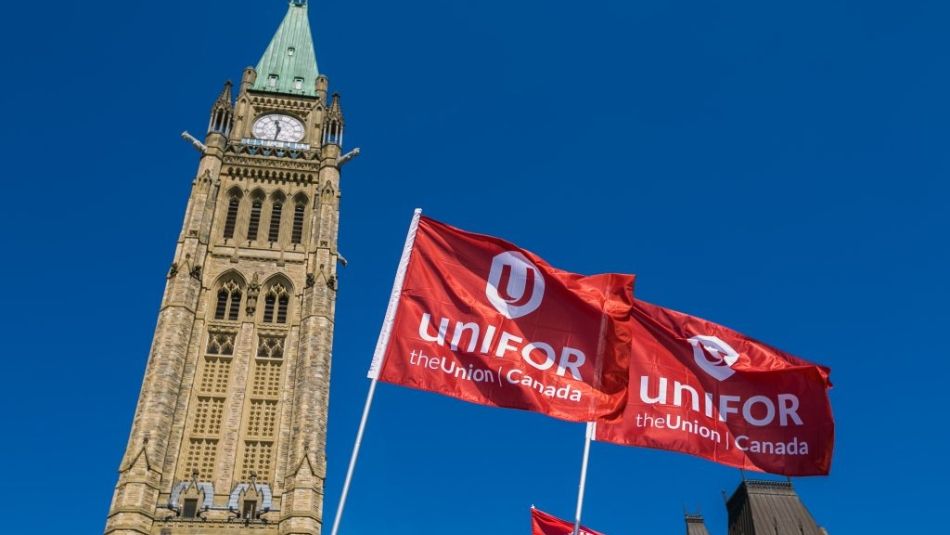
Share
OTTAWA – Unifor, Canada’s largest private sector union, says Finance Minister Chrystia Freeland tightened the belt on workers in this year’s federal budget.
“Unifor is pleased there was some continued effort to improve the lives of workers in Canada by investing in programs that move the country towards a fair, inclusive and resilient economy,” said Lana Payne, Unifor National Secretary-Treasurer. “But the goalposts and investments fall far short of what we need after two turbulent years of a pandemic.”
This budget is a mixed bag for workers and families. Unifor is pleased to see the government use the unforeseen revenue generated by a stronger-than-expected economic recovery to invest in people and industry. Still, it failed to capitalize on opportunities to improve on important programs and services.
Unifor supports the development of a critical minerals strategy, necessary to maximize the full value of Canada’s electric vehicle industry.
Quebec Director Renaud Gagné said the $3.8 billion allocated over eight years to mining, processing, manufacturing and recycling sends a strong signal that the government is in this sector for the long haul, recognizing the value it will create for the economy, including by creating and sustaining good jobs.
The budget extends the current iteration of the iZEV program for zero-emissions vehicles – a move that Unifor supports – but fails to expand the size of the overall incentive. Unless provinces pick up the slack, this incentive, alone, will not drive electric vehicle adoption, especially for forthcoming Canadian-built vehicles.
The union is also pleased to see more than $500 million earmarked for additional electric vehicle charging stations. However, Budget 2022 fails to provide a set of clear benchmarks for charging infrastructure, ensuring that access to charging will be available to anyone driving EVs in future.
Unifor is also concerned that the budget doubles down on government plans to privatize the VIA Rail Toronto to Quebec City corridor through a P3 – a public-private partnership.
“This is a plan forecasted to go off the rails,” said Payne. “Privatization in transportation means higher costs, broken promises, worse service and route closures. Unifor’s campaign, Get Canada Back on Track, will vehemently fight this move and demand the government create a national rail service that provides safe, reliable, frequent transportation across the country along with good, green long-term jobs.”
Dental care and pharmacare are important investments in Canada’s health care system. A fully implemented, $5.3 billion dental plan for families with incomes under $90,000 in 2025 is good news, but waiting until the end of 2023 to get the pharmacare details is disappointing, particularly because the country has already been waiting for years.
The government extended temporary supports for seasonal workers under the Employment Insurance program but failed to extend any other temporary measure currently set to expire in September, including extending regular benefit duration to 50 weeks and suspending the separation payment allocation. The union has made extensive recommendations on how to improve EI, but so far government has yet to move on any of them.
COVID-19 cases are soaring across the country, yet, the government has decided to not renew any financial supports for those who become too sick to work or need to isolate.
In long-term care, there was hope the government would take some important steps to re-orient long-term care towards not-for-profit models to improve quality of care and employment. But no moves were made on this front.
There was also hope the government might address the under-paid and under-resourced nature of much of the care economy. But, even after all the lessons learned through the pandemic about the essential nature of care work, workers in the industry did not see any efforts to raise wages, improve working conditions or increase staff.
The budget invests an additional $1 billion in the Universal Broadband Fund. This investment will increase broadband Internet access for people in underserviced areas but more attention must be paid to ensuring the jobs that are created in the sector provide high quality employment.
Unifor supports the Liberals’ $11 billion investment to support Indigenous families, children and communities – of which $210 million from the budget aids in communities documenting, locating and memorializing burial sites at former residential schools.
The Canada Recovery Dividend will be a useful move to address excessive profits achieved by banks and insurance companies during the pandemic. At the same time the efforts fall short of the recommendations Unifor made to build tax fairness, including implementing a wealth tax, closing numerous loopholes and clamping down on tax havens.
“We can’t go back to the economy we had,” said Payne. “The world has changed after the pandemic and the government needs to tilt the table towards fairness and equity. We look forward to working with this government to continue to make change a reality.”
For media inquiries or to arrange a follow up FaceTime, Zoom or Skype interview in English please contact Unifor Communications Representative Kathleen O’Keefe at @email or 416-896-3303.


